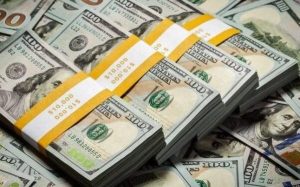
London — The dollar eased on Wednesday after data showed the Chinese economy slipped into deflation last month, which upped the chances for the government to roll out extra stimulus measures and nudged investors into risk assets.
Dollar selling by state-owned Chinese banks helped the yuan rally from a one-month low, dealers said. The Chinese central bank’s stronger-than-expected exchange-rate fixing at 7.1588 per dollar before the open signalled its discomfort with the yuan’s recent declines.
The dollar index – which measures the performance of the U.S. currency against six others – eased 0.1%, paring some of Tuesday’s 0.47% rise.
The euro rose 0.2% to $1.0978, while sterling eased 0.1% to $1.274. European markets gained some respite after equities tumbled the day before as the Italian government announced a surprise 40% windfall tax on banks. The finance ministry subsequently softened its stance, but the initial decision stripped 3.5% off major euro zone lenders’ shares (.SX7E).
Data on Wednesday showed Chinese consumer prices fell for the first time in more than two years in July. Rather than lifting safe-haven appetite for the dollar, the figures reinforced the view among some investors that the Chinese government might take steps to underpin the economy with monetary stimulus.
“There’s still no signs yet from officialdom of imminent support” for the Chinese economy, despite the “protest of sorts against the recent run-up in the dollar-yuan rate” implicit in the strong yuan fixing, said Ray Attrill, head of foreign-exchange strategy at National Australia Bank.
With that in mind, weakness in the dollar might not last long, according to Ricardo Evangelista, a senior analyst at ActivTrades.
“Chinese inflation data showed that consumer prices have barely moved in July, confirming that the world’s second-largest economy is stalling and may be moving into deflation,” he said.
“Against this background, any greenback losses will be limited as worries over the prospects of the global economy could soon reignite dollar demand,” he said.
U.S. inflation data is due on Thursday and looms large over a market hungry for clues on the path for Federal Reserve policy and, for now, this is likely to carry more weight for investors than a retreat in price pressures in China, according to Daiwa Capital Markets head of economic research Chris Scicluna.
“Really, the central bankers, whether it’s the Fed, or the ECB or the Bank of England, are concerned about services prices and also about the overall tightness of the labour markets and that’s not going to change because of what is going on in China,” he said.
There were more dovish signals from Fed officials overnight, with Philadelphia Fed President Patrick Harker suggesting interest rates are high enough already, echoing the view of Atlanta Fed President Raphael Bostic.
The message has been far from uniform though, with Fed Governor Michelle Bowman saying on Monday that further hikes are likely.
Money markets show most traders expect no change from the Fed at its policy meeting in September. There is just a 13.5% chance of a quarter-point rise, according to the derivatives market.
*Amanda Cooper, Kevin Buckland; Brigid Riley; Editing: Simon Cameron-Moore, Kirsten Donovan – Reuters



